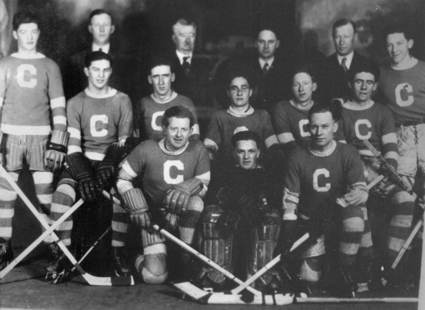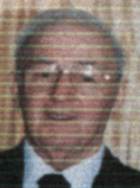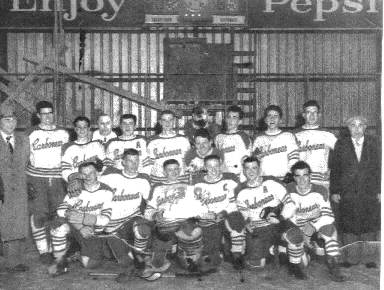
By Neil Earle

Any young tyke lucky enough to have had an aunt and uncle living next door to the local movie theater in the 1950s was almost guaranteed to have a happy childhood. Especially when that aunt and uncle were Roy and Blanche Howell.
Even to this day when I walk into a gleaming new superstar Cineplex or pass the famous Grauman's Chinese Theater here in Los Angeles it is the cozy Bond Theater in Carbonear, Newfoundland, Canada and my Uncle Roy Howell that springs to mind. Roy Howell's claim to fame in my memory, of course, rests on far more nobler title than his place of residence. For Roy Howell was a man in a world of rugged men, a community leader, a church man, a family man and one of the best athletes and architects my home town has produced.

He was also a straight shooter, a quiet man of God, a man of deep private spirituality who would not easily pass judgments on others and their relationships with the Almighty. I still have the image of his no-nonsense stabilizing influence long-time friend and Deputy Mayor Len Pike wrote my mother. As Len also noted, Roy was just the best man to have on your side when your hockey team needed to protect a one-goal lead near the end of the third period.
Roy Howell came from a large, well-respected family, my mom's folks, the Howells of Carbonear, Newfoundland. It was a family devoted to community and possessed of a lively, outgoing spirit. They still are. Their energy amazes me. One evidence was the fact that Uncle Roy, his brothers and his father (my grandfather) helped build the first indoor hockey and skating rink in my part of the world. That was 1935, during the frigid depths of the Great Depression, but there was a life to be lived and young people must have a place to meet so the old Jubilee Rink was duly built, virtually in what would be Roy's back yard. The 1930s was still the era of small-town Newfoundland, small-town North America, and the complicating factor in a small town – as anyone knows who hails from one – is that to keep and maintain your community's respect you have to live and practice integrity. You have to walk the walk as well as talk the talk.

My uncle Roy was integrity with a capital I. He was solid, dependable, a generous man without an ounce of pretence or sham. He didn't say a lot but his high intelligence and experience in directing men and women over a long and successful life as a builder and architect meant that when he spoke it was from the heart, having something worthwhile to say. I doubt if anyone ever heard him swear or utter profanity either on the soccer field or the hockey ice where he excelled in the heartfelt, rough and tumble of that pre-World War Two era. Roy was a lifelong supporter of the United Church of Canada and a teetotaler yet such a presence that even the wild rowdies had to respect him.
Muscular Christianity the Victorians used to call it. Life as a field of honour.
Did I say respect? Yes, boy, hold your tongue, as they say in Newfoundland. For Roy could take you out with a clean but effective body check and skate like the wind. I remember him at an Air Cadet father/son night watching him dominate a game of floor hockey with speed and finesse as I gaped from the sidelines. That was in the 1960s and he was in his forties. I remember thinking that everything I had heard people say about my uncle's skill and dexterity hit home. My dad was right: everyone who ran into Roy Howell, fell.
Wow! Even my athletic cousin Ron met his match that night. Uncle Roy was the Dominator long before the Buffalo Sabres coined the phrase.

Lest this remembrance seem weighted too much to athletics, let's remember that another characteristic of small town North America used to be that sports – not clothes – made the man. Through community sports your character and integrity – what made you "you" – was on display. In one of the last talks I had with my uncle Roy it was all about hockey and his brilliant coaching of our home-town team in 1958. Oh, yes, 1958. How I remember. A young Carbonear team faced off against the heavily-favored Shearstown Tigers. "After the first game," Roy said, "I knew we wouldn't lose another. I'd figured out their strategy." Did he like modern hockey? "No, way too much unnecessary roughness." What was his most outstanding memory? When the coach wouldn't play him in a fierce game against the Buchans Miners. He figured Roy was too young. In the last period the coach relented, and Roy popped in 6 goals in a losing cause.
He loved telling that story!
No wonder that a brand new Roy Howell Memorial Award was just established in Carbonear to honor "his all round career as a sports player, coach and builder."
In an emotion-etched ceremony at Carbonear on April 1, Dr. Phil Earle – no mean athlete himself – said a moving tribute. "I am humbled by the passing of this beautiful man," Phil said. "When my grandmother died 20 years ago, I was away and my mother was alone to handle everything by herself. My mother told me the first person in the door was Mr. Howell. She said he was there every day for her and to help her with the arrangements of the funeral."
Few knew the soft side of this caring and noble husband and father, that he would, for example, write lines of poetry for his beloved wife, Blanche, every chance he could get and keep it secret for almost forty years. Few could match his devotion to her in her closing years as she was stricken with illness but courageously stayed involved in life up till the very end. Life is to be lived – every minute of it. They know that in Newfoundland. My aunt and uncle knew it well.
Pike remembered Roy's community service – a valued and respected employee, a faithful and conscientious (Town) Councilor. He was truly an example to be emulated in every and all endeavors. It was only fitting that two of the winning Carbonear Caribous of 1958 were among his pallbearers – Reg Parsons and Carl Penney. Life is a field of honor. Roy Howell's life could attest to that. Perhaps Shakespeare had it wrong. Perhaps the good that men do lives after them, after all. My cousin Phil said it best: "To me, he set the standard of what it is to be a man."
We'll not see his like again.